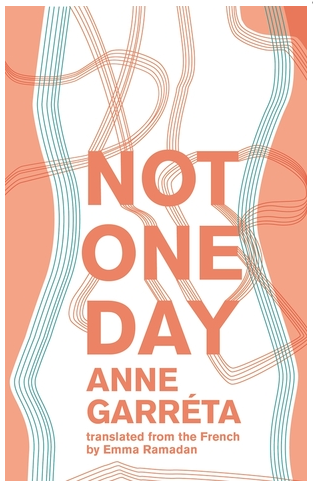GARRÉTA, ANNE. RAMADAN, EMMA (Translation) Not One Day. (Pas un jour). Deep Vellum Publishing. 05/2017. $14.95 Paperback. 9781941920541.
 Not One Day is a memoir (of sorts) by French author Anne Garréta, in which she revisits the women she’s loved, in reflections which vary in tone, length, and content. Not all of the women she’s loved have loved her, and not all are lovers, but all made an indelible mark on the author’s life in ways that show through in the writing.
Not One Day is a memoir (of sorts) by French author Anne Garréta, in which she revisits the women she’s loved, in reflections which vary in tone, length, and content. Not all of the women she’s loved have loved her, and not all are lovers, but all made an indelible mark on the author’s life in ways that show through in the writing.
Anne Garréta belongs to the writing group Oulipo, a group made of writer and mathematicians who write under constraint to see what becomes of art when it is premeditatedly confined. In keeping with that theory of writing, Garréta outlines the restrictions she plans to employ at the outset: she will spend one day writing about a woman who has loved her or whom she has loved, she will write them in the order in which they occur then arrange them alphabetically in the final product, she will spend five hours on each person over the course of twelve days. The stage is set, the author is clearly apprehensive at revealing what she will, but determined to see this project through. And she does. Mostly. And also mostly does not.
This is a great little one hour read that will defy your expectation in some very interesting ways. It is a memoir, but maybe not entirely. And it is in translation, but translated with assistance from the author herself, which makes this less clunky than translations which can sometimes be more interested in the original words than the intent of the author. This feels as though it is meant to be readable, emotional, and perhaps a little coy. Written in second person, the author chides herself throughout, in one instance slipping into an “I” instead of a “you” and then catching the slip, stopping readers in their tracks to wonder about the shift. Was this woman more important, or this situation? The post scriptum offers another option, one which you will not have considered, and effectively turns everything you’ve read on its head. It is brilliantly written as both apology and taunt.
This is a book for those who don’t mind a little unease in their reading experience. It will not go where readers expect, and that imbalance is part of the structure of the entire narrative. It is also for those who relish language, particularly the way words can build a foundation for trust, can intimate the unspoken, and can leave you reeling.
For life is too short to resign ourselves to reading poorly written books and sleeping with women we don’t love.
Nadia M Sahi
(She/Her/Hers)